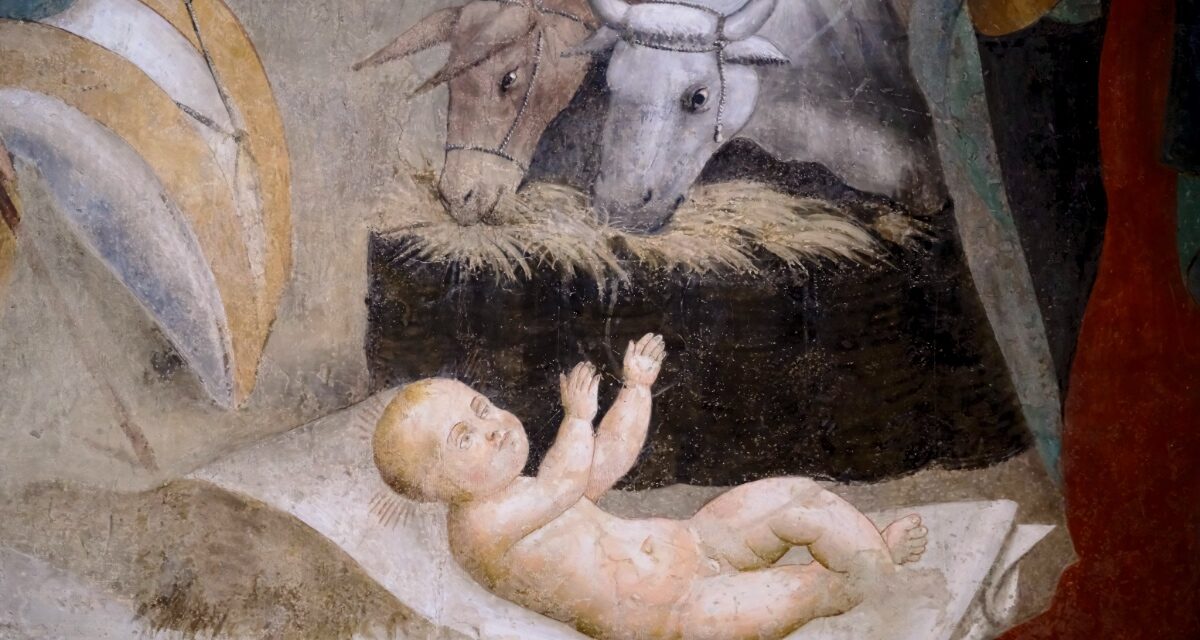Why did Jesus come to earth? Have you thought much about what you believe about the Incarnation? How do you image God’s relationship to our human activity in the world? How do you image God’s concern for the life of the planet itself? What exactly needs saving?
 The Incarnation is not just the moment of Jesus’ conception or his birth, but the entire reality of his life, death, and resurrection. The early church understood the Incarnation through the eyewitness accounts of Jesus’ life and the disciples’ experience of him. This was passed on and recorded in the Gospels.
The Incarnation is not just the moment of Jesus’ conception or his birth, but the entire reality of his life, death, and resurrection. The early church understood the Incarnation through the eyewitness accounts of Jesus’ life and the disciples’ experience of him. This was passed on and recorded in the Gospels.
Paul emphasises in wonder that God took on humanity. In that action, God showed a different side: a God whose love is bound up in emptying, humility, and obedience to a kind of love that leads him to the cross.
Let the same mind be in you that was in Christ Jesus,
who, though he was in the form of God,
did not regard equality with God
as something to be exploited,
but emptied himself,
taking the form of a slave,
being born in human likeness.
And being found in human form,
he humbled himself
and became obedient to the point of death—
even death on a cross.(Philippians 2:5-8)
 The Dream
The Dream
The Incarnation sets off the dream I think God has had all along: to draw us into a uniting love through emptying, humility, and obedience. Ignatius, in the Spiritual Exercises, tells us that the way of Jesus is through a similar three: poverty, lowliness, and humility. The three evangelical counsels, which religious typically profess are chastity, poverty, and obedience. Pope Francis describes chastity as “freedom from possessiveness in every sphere of one’s life.” A possessive love is not authentic love. Authentic love requires humility, it requires an emptying of one’s egoic agendas. And its obedience is in its intentional orientation outward, rather than the ego. So the entire pattern of Jesus, which is expressed throughout the Christian tradition, is a call to a freely given, non-possessive love that draws people toward one another and thus toward God. (This is basically the Principle and Foundation).
This dream of God is unfolding and we help make it happen. We humans certainly do this poorly, at times. We become possessive, obsess over riches, or become preoccupied with honour and status. The reason for this is because the ego doesn’t like to listen. The word obedient comes from the Latin obedire, which means to listen. How do we learn to listen? We practice it daily.
What are we listening for?
God, obviously. But what does that mean? The Christian approach to discernment involves opening our eyes and ears to the presence of God in our everyday life. We must listen to our lived experiences, our feelings and desires, the people in our life (and their needs), how scripture speaks to us, what our tradition says. We listen to the cacophony in all its nuance. And in it we listen for God. It’s what the church calls finding God in the signs of the times.
How do we learn to listen?
Hurriedness is one reason we fail to listen. When we move so fast through life then life is living us, not the other way round. By intentionally slowing down we can begin to listen to all the things mentioned above. And if we can enter into a space of silence, putting away distractions, our ears will hear even more. Praying the Examen is an intentional way of slowing down, quieting ourselves, and gently listening for God in our lived experience. We learn the skill of spiritual listening through daily practice.
Over time, as we more and more notice God’s involvement and nudging and our areas for growth, we slowly can move out of our ego and toward a non-possessive love like that of Jesus. Listening helps us notice the unhelpful things that fill our lives and hearts so we can empty ourselves of them and be more available to love others. And over time we will see the Fruits of the Spirit emerge: love, joy, peace, patience, kindness, generosity, faithfulness, gentleness, and self-control.
This post is about the Incarnation, yet it may seem that I’ve strayed from that topic. On the contrary, this is all the Incarnation is about. It’s about you and me and we—living into God’s dream for the world. Jesus is the one who shows us just how we live out God’s dream. “Learn from me,” Jesus tells his followers. “For my yoke is easy, and my burden is light.” Praise for the Incarnation!
Aside from the related posts below, you may like to enter more deeply into the qualities of Jesus with our audio meditation And He Is Named (also found on the Ignatian Audio Meditations podcast). Do the work of listening by reflecting on the fruits of the Spirit in your life with a deck of Magis Cards (get 15% on that or anything at Ignatian Resources with the coupon code ADVENT21).
Related posts:
Listen to the audio version of this post…








